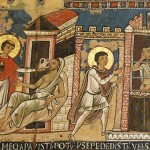We run our website the way we wished the whole internet worked: we provide high quality original content with no ads. We are funded solely by your direct support. Please consider supporting this project.

How the Church is Tempted to “Do Good”
The previous post spoke of God’s call to the church to be resident aliens: a holy, distinct people who are set apart and peculiar when compared to the patterns of the world. The holiness of God’s kingdom is cruciform love, which constitutes our distinct witness to the world. Preserving this holiness and resisting the Devil’s temptation to do good according the patterns of the world is ongoing. When we succumb to Satan’s temptation it only reduces the kingdom of God to another version of the kingdoms of the world.
We are not to be ignorant of this temptation and how it lures us in. Therefore, it is helpful to understand how Jesus himself was tempted to do “good.” The Devil tempted Jesus by offering him all the kingdoms of the world without having to go to the cross (Luke 4:6-8). In essence, the Devil was offering him the very thing he came to get, for Jesus came for the people of the world, and people are always subjects of some kingdom or other. To rule the people, all Jesus had to do was submit to the “god of this age” and leave him in place as its ruling authority.
Without having to suffer and die, Jesus could have immediately taken a position as the functional lord of all these kingdoms. Jesus could have quickly overpowered evil in all societies. He could have immediately alleviated much, if not all, suffering and created a kingdom of the world that enacted perfect law, order, and justice. Not only this, he would have thereby fulfilled all Israel’s expectations of what a messiah was supposed to be.
The Devil’s temptation would not have been a genuine temptation for Jesus unless there was a lot of “good” wrapped up in it. The same is true for us today. However, if Jesus would have taken the course of action offered by Satan, Jesus’ rule would have been part of Satan’s system of domination, which currently runs the world.
Jesus refused this “good” approach. He did not come to make the kingdom of the world a new and improved version of itself. He came to transform “the kingdom of the world” into “the kingdom of our Lord and of his Messiah” and thereby establish the rule of God.
As tempting as it was, Jesus was not going to allow the radical distinctiveness of the kingdom of God to be co-opted by the demonically ruled kingdom of the world—even if the immediate results were “good.” John Howard Yoder once wrote: “The cross is not a detour or a hurdle on the way to the kingdom. It is the kingdom come.” Sacrificial love, therefore, isn’t simply an effective way to make the world a better place, it is the “set apart” kingdom of God on earth! When one obeys God and loves as Christ loves in a kingdom-of-the-world context, it always looks like this.
This is why everything hangs on not allowing it to become co-opted by immediate, obvious, and self-serving kingdom-of-the-world methods, however good the immediate consequences may appear.
—Adapted from The Myth of a Christian Nation, pages 73-75.
Category: General
Tags: Cruciform Theology, Myth of a Christian Nation
Related Reading

Cruciform Aikido Pt 2: God-Forsaken Judgment
So if Jesus is the supreme revelation of what God is like, as we explained in our last post, what does that tell us about the nature of God’s judgment?
As Jesus was dying on the cross he cried out, “Eli, Eli, lema sabachthani?,” which means, “My God, my God, why have you forsaken me?” (Mt. 27:46). This shocking cry reveals…

Are You Fully Alive? Here’s the Key
Image by rashdada via flickr. The cross reveals the full truth about us. This truth reconnects us with our true source of life, which in turn heals our idol addictions. This dimension of the cross is frankly so breathtakingly beautiful that, so far as I can tell, very few followers of Jesus have ever really grasped it.…

Do the Gospels Fabricate Prophetic Fulfillment?
Skeptically-inclined scholars, and especially critics of Christianity, frequently argue that the Gospel authors created mythological portraits of Jesus largely on the basis of OT material they claim Jesus “fulfilled.” In other words, they surveyed the OT and fabricated stories about how Jesus fulfilled those prophecies. In response, it’s hard to deny that there are certain…

God’s Heart to Prevent Judgment
In Ezekiel we read a passage that depicts Yahweh as warning his people about their impending punishment by saying, “I will pour out my wrath on you and breathe out my fiery anger against you” (Ezek 21:31a). As we find in several other texts, Yahweh is here depicted as a ferocious fire-breathing dragon—a portrait that…

Jesus, the Center of Scripture
Paul declared that Jesus was nothing less than the very embodiment of all of God. This distinction of “all of God” is important for us to understand what it means for us to see Jesus and God rightly. Battling proto-gnostic teachers who were apparently presenting Christ alongside other manifestations of God, Paul declares “in Christ…

The Call to a Cruciform Life
Jesus repeatedly taught that following him meant that one had to be willing to “pick up their cross daily and follow [him]” (Lk 9:23; 14:27). Picking up our cross is the centerpiece of following Jesus because this was the centerpiece of what Jesus was all about. The thematic centrality of the cross is also illustrated…
